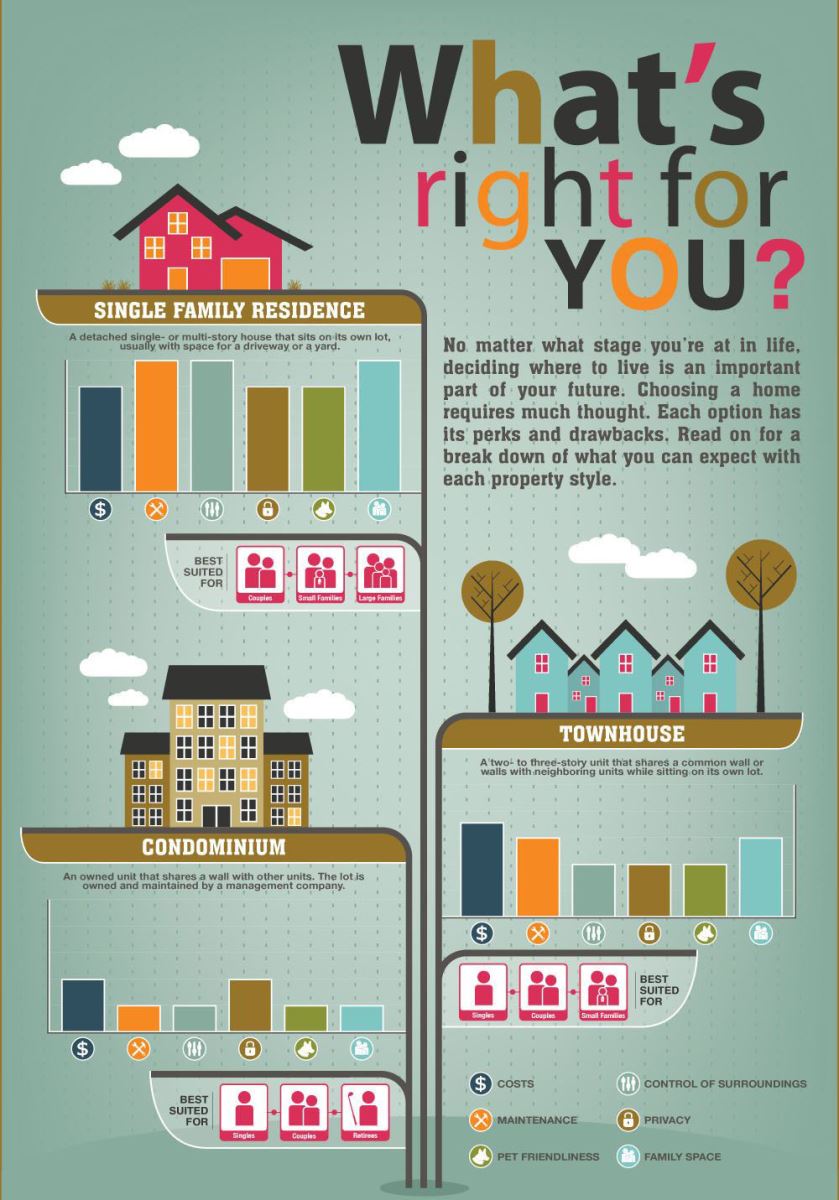Condo vs. townhouse: Which is best for you?
April 8, 2020

Condos, short for condominiums, are units within a larger building. These homes are typically on one level. Because condos tend to have more residents per building than townhouse communities, they sometimes have amenities including a pool, clubhouse, library, gym or even special services like a concierge or dry cleaning delivery.
On the other hand, a townhouse community can give homeowners a hybrid experience of living in their own house while having some of the perks of community membership. Townhouses are individual homes with multiple levels built side-by-side, sharing exterior walls with neighbors. These “row houses” tend to have more square footage and more spacious floor plans than condos and may have attached private garages.
Things to consider
- Cost: Since condos tend to be smaller than townhouses, they may be less expensive, depending on the market. However, condos generally have higher monthly HOA dues because of more robust amenities, while townhouses often have lower HOA fees.
- Maintenance: Typically, condos require the least amount of maintenance of all housing types. Townhouse owners have to maintain the home’s exterior (the roof and siding), outdoor living spaces and a small yard. While the maintenance isn’t as involved as a single-family home, it’s certainly more extensive than a condo unit. Budget and plan accordingly for the extra upkeep.
- Amenities: Think about what amenities that are most important to you — like security services, a pool, gym or a dog park — and compare what the various communities in your area offer.
- Location: Location is an important factor to consider when buying any home. Condos — particularly high-rise condos — are often more centrally located in city centers, while townhouse neighborhoods tend to sit on more land, so they may be less convenient to walkable spots (restaurants, stores and businesses) within a city.
- HOA rules: As a general rule of thumb, condos tend to have more specific — some might say restrictive — rules for residents. These can include days and times which trash can be left out, rules about exterior decorations and what items residents are allowed to store on their patios. While townhouse neighborhoods still have rules, such communities typically allow more freedom to townhouse vs. condo owners. Be sure to review your desired community’s rules in detail before purchasing.
Who is a condo best for?
In the great townhouse vs. condo debate, condos are ideal for buyers who don’t mind living with other residents on the floors above, below and next to them. Condos are also a smart buy for anyone who values having all of their living space on one floor — this could be an older buyer who anticipates having challenges with stairs or someone who likes the ease of cleaning just one level.
Because condo buildings typically have a smaller footprint for more individual dwellings (think of a high-rise structure full of units) they tend to be in the midst of bustling areas of town with lots of shops, restaurants and businesses nearby. If walk-ability to neighborhood attractions is important, a condo could be the right fit for you.
Who is a townhouse best for?
If you’re considering a single-family home or a community property, a townhouse is a nice middle ground because you’ll enjoy many single-family home perks along with the benefits of community living. A townhouse is best for home buyers looking for more space than a condo and multiple floors (can be ideal for families who prefer bedrooms situated away from living spaces). Some townhouses might come with a small yard or garden, and even an attached garage. You’ll have more maintenance than a condo, so make sure you know what your responsibilities will be (and the costs associated with them). If you’re up for a bit more upkeep and have room in your budget for added maintenance and repair costs, owning a townhouse might be up your alley.






